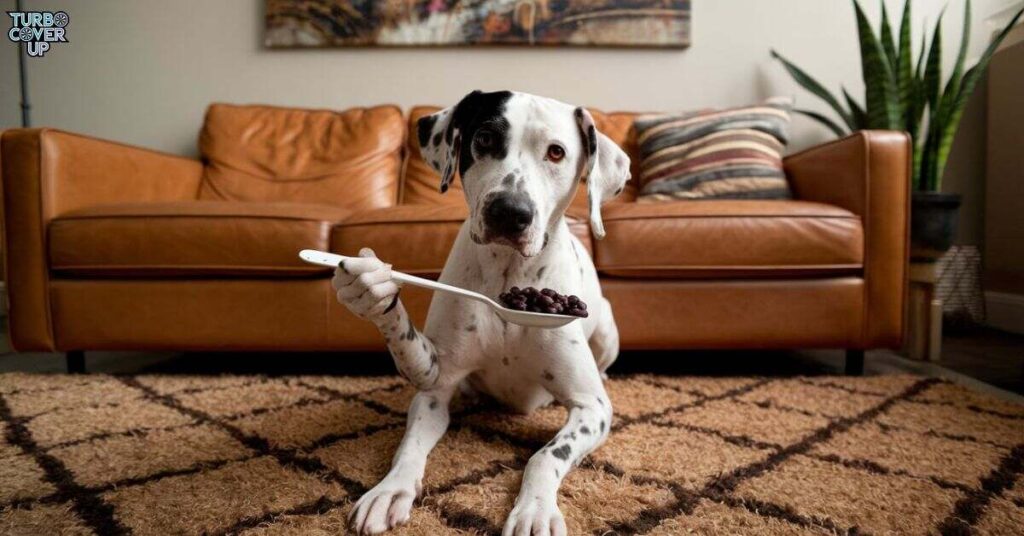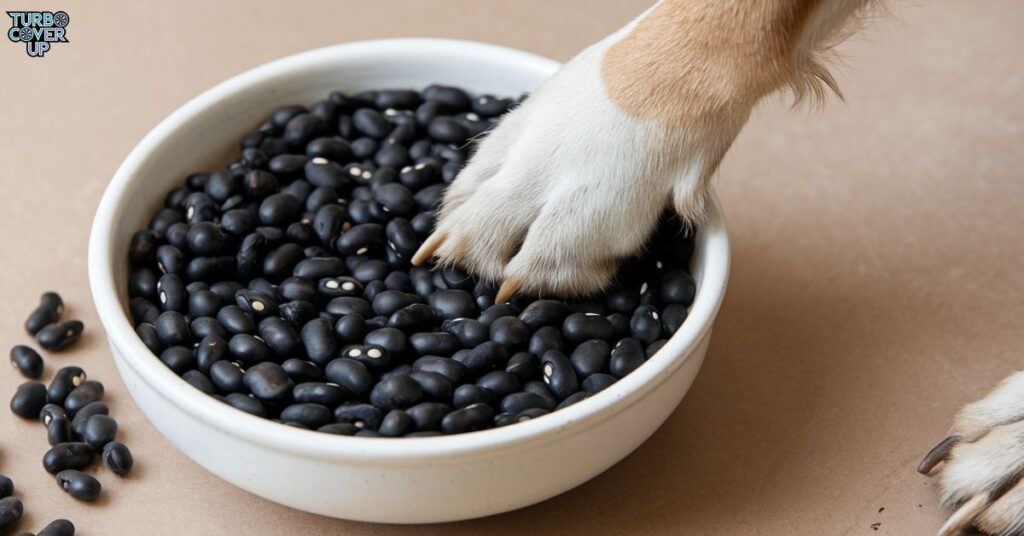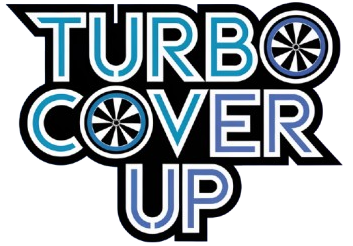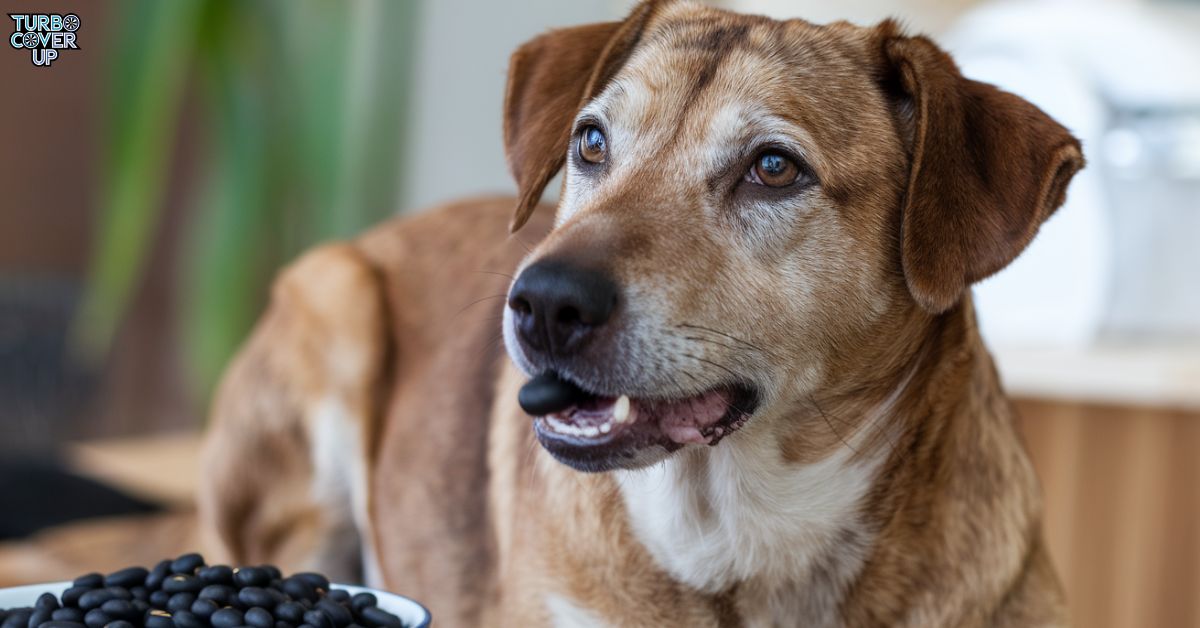Black beans are small, nutrient-rich legumes often used in various meals. They’re packed with protein, fiber, and essential minerals, making them a healthy option for humans. But when it comes to your dog, you might wonder if they’re safe to eat.
Feeding them cooked and plain beans without seasonings ensures your pup stays healthy. Too many beans could lead to digestive problems, so portion control is key.
In this article, we’ll discuss the benefits and risks of feeding black beans to your dog. You’ll learn how these legumes can fit into your dog’s diet while keeping their health in check.
Can Dogs Eat Black Beans
Yes, dogs can eat black beans, but only in moderation. Black beans are safe for dogs if given in small amounts. These beans are full of protein and fiber, which help your dog stay strong and healthy. Cooked black beans without any spices or seasonings, like garlic or onion, are the best choice. Spices can be harmful to your dog, so plain beans are a safer option.
Feeding too many black beans can cause stomach problems like gas or bloating. It’s important to give only a few at a time and watch for any bad reactions. If your dog eats the beans without problems, they can be a good, healthy treat once in a while.
The 6 Benefits of Black Beans
1. Protein Powerhouse
Black beans are a great source of protein. Protein is important for building muscles and keeping the body strong. Dogs need protein to grow and stay active. Black beans provide plant-based protein that helps support your dog’s muscles. This protein also helps with tissue repair after exercise, keeping your dog in top shape.
Active dogs need protein to stay healthy and recover from activity. Besides helping muscles, protein also supports a shiny coat and strong nails. Black beans give your dog these benefits while being easy to include in their diet. Feeding black beans in small amounts can add a boost of protein, but it’s important to remember to feed them without any spices or seasonings.
2. Fiber-Filled
Black beans contain a lot of fiber, which helps with digestion. Fiber helps keep your dog’s stomach working well and ensures everything moves smoothly. It can also help your dog feel full after eating, which is helpful if they need to lose weight.
A diet with enough fiber helps your dog avoid overeating. Fiber also keeps their bowel movements regular, preventing constipation. Black beans, when given in small amounts, provide a natural way to add fiber to your dog’s meals without causing harm.
3. Mineral Magic
Black beans are full of important minerals like iron, calcium, and magnesium. Iron helps carry oxygen in your dog’s blood, which is needed for energy and good health. Calcium and magnesium help keep bones strong and support many body functions.
These minerals keep your dog’s body working well. Strong bones are important for running and playing, and iron makes sure your dog stays active. Adding small amounts of black beans to your dog’s meals can give them these valuable minerals without upsetting their diet.
4. Vitamin Vault
Black beans are rich in vitamins like vitamin C, vitamin K, and folic acid. These vitamins help support your dog’s immune system and keep them healthy. Vitamin C helps the body fight off sickness, while vitamin K plays a key role in blood clotting. Folic acid helps with cell growth and can keep your dog feeling energetic.
Including black beans in your dog’s diet can provide these essential vitamins. A strong immune system helps your dog stay active and happy. It is important to give black beans in small amounts to avoid any stomach issues. Always cook the beans without spices before sharing them with your furry friend. This way, your dog can enjoy the health benefits of black beans safely.
5. Stronger Bones and Muscles
Black beans help build stronger bones and muscles in dogs. They contain calcium and magnesium, which are important for bone health. Calcium keeps bones strong, while magnesium supports muscle function. Together, these minerals help your dog stay active and fit.
When dogs have strong bones and muscles, they can play and run without pain. This is especially important for older dogs that need extra support. Including black beans in their diet can help maintain bone density and muscle strength. Always serve beans in small amounts and without any spices. This way, your dog can enjoy the benefits of black beans while staying healthy.
6. Better Skin and Coat Condition
Black beans can improve your dog’s skin and coat condition. They contain protein, which is vital for healthy skin and fur. A good coat keeps your dog warm and protects them from the weather. When dogs have enough protein, their fur looks shiny and feels soft.
Vitamins and minerals in black beans also help skin health. These nutrients support cell repair and reduce dryness or irritation. Dogs that eat a balanced diet with black beans can have healthier skin. This can make them feel more comfortable and look great. Always serve black beans in small amounts and ensure they are cooked without spices. This way, your dog can enjoy the benefits without any issues.
The 6 Potential Risks of Black Beans

It’s crucial to be aware of the potential downsides of black beans. While they can be healthy, they might also cause digestive problems for some dogs. Signs like gas, bloating, or diarrhea can happen if they eat too many. Therefore, always introduce new foods slowly and monitor your dog closely. This way, you can ensure their diet remains safe and enjoyable.
1. Digestive Issues
Dogs may face digestive issues when they eat too many black beans. These problems can include gas, bloating, and diarrhea. A dog’s stomach can struggle to break down beans. This is especially true if they are not used to them.
To prevent these issues, always introduce black beans slowly. Start with a small amount and watch for any signs of discomfort. If your dog shows signs of digestive trouble, stop feeding them black beans right away. It is important to consult your vet for advice. They can help you decide the best diet for your dog. Keeping your dog’s digestive health in check is key to their overall well-being. Always ensure a balanced diet that suits their needs and avoids any food that causes problems.
2. Allergic Reactions
Some dogs can have allergic reactions to black beans. This means their bodies do not react well to them. Signs of an allergy include itching, swelling, and trouble breathing. If you notice these symptoms, it is important to act quickly.
Take your dog to the vet if any signs of an allergic reaction appear. The vet can help identify the cause and suggest the right treatment. Avoid giving your dog black beans if they show any signs of an allergy. This keeps your furry friend safe and healthy.
Allergies can happen to any dog, so always monitor what they eat. A careful approach to new foods helps ensure your dog stays happy and healthy. Always consult your vet when making changes to your dog’s diet. Their guidance can help prevent allergic reactions and promote overall well-being.
3. Weight Gain
Black beans can contribute to weight gain in dogs if they eat too many. These beans are high in calories. While fiber can help with digestion, too many beans can lead to extra pounds. It is essential to keep track of how many black beans your dog eats.
A small portion is fine, but moderation is key. A few tablespoons can be a good treat, but avoid large amounts. Regular exercise is also important to prevent weight gain. If your dog becomes overweight, it can lead to health problems. Always balance treats like black beans with your dog’s regular diet.
Consulting your vet about portion sizes is a great idea. They can help create a feeding plan that keeps your dog fit and healthy. Keeping a watchful eye on your dog’s weight will help ensure they live a long and happy life.
4. Nutrient Imbalance
Feeding your dog too many black beans can cause a nutrient imbalance. While these beans contain many healthy nutrients, they lack others. Dogs need a balanced diet to stay healthy. Black beans should not replace high-quality dog food that meets all nutritional needs.
Relying too much on black beans can lead to missing important vitamins and minerals. Each food has a specific role in your dog’s diet. Giving only black beans may lead to deficiencies over time. It is best to feed beans as an occasional treat, not a main meal.
Always include a variety of foods in your dog’s diet to ensure they get everything they need. If unsure about what to feed your dog, talking to your vet is a good idea. They can help you create a balanced feeding plan that supports your dog’s health.
5. Oral Health Problems
Black beans can cause oral health problems for dogs. These beans can stick to a dog’s teeth. This sticking can lead to plaque buildup over time. Plaque can turn into tartar, which is harder to remove. If not cleaned, tartar can lead to gum disease and tooth decay.
Keeping your dog’s mouth healthy is important. Regular dental care can help prevent issues. Brushing your dog’s teeth is a good idea. Providing dental chews can also help clean their teeth. If your dog shows signs of oral problems, such as bad breath or bleeding gums, see a vet.
They can check your dog’s teeth and gums. Good oral hygiene can help your dog live a happy and healthy life. Keep an eye on your dog’s mouth to ensure they stay healthy and free of dental issues.
6. Signs to Watch Out For
When introducing black beans to your dog’s diet, some signs to watch out for are important. Dogs may show signs of nausea if they do not handle black beans well. Look for symptoms like vomiting, diarrhea, or loss of appetite. These issues can mean the beans are upsetting their stomach.
Changes in behavior may also signal a problem. If a dog seems tired or less playful, something may be wrong. Pay attention to how your dog reacts after eating black beans. If any of these signs appear, it is essential to consult a vet.
They can provide advice and check for any health issues. Taking these steps can keep your furry friend healthy and happy. Monitoring your dog’s health helps ensure they enjoy their food without problems. Always be alert for signs of discomfort or illness.
Feeding Black Beans to Your Dog

Black beans can be a healthy snack for your dog, but it’s important to be cautious. Start by introducing small amounts to their diet. Doing this over a week or two helps your dog adjust. Gradual changes reduce the risk of digestive problems, such as gas or upset stomach.
Cooking Tips
Cooking black beans for your dog is very important. Raw beans can contain toxins that are harmful to dogs. Always cook the beans thoroughly before giving them to your pet. This makes the beans safe to eat and easier to digest. Rinse the beans well to remove any dirt before cooking.
Avoid adding salt or spices while cooking. These can upset your dog’s stomach and cause health issues. Plain black beans are best for your furry friend. Start with small portions when feeding them beans. This helps your dog adjust and prevents digestive problems.
Monitor your dog for any signs of discomfort after eating. If everything goes well, black beans can be a healthy treat. They are full of nutrients that support your dog’s overall health. Following these cooking tips will help keep your dog safe and happy.
Portion Sizes
Portion sizes are important when giving black beans to your dog. These beans should not make up more than 10% of your dog’s daily food intake. Start with just one or two tablespoons. This small amount helps dogs adjust to new foods. It is essential to watch your dog for any signs of discomfort.
If your dog handles the beans well, you can gradually increase the portion size. Always keep an eye on your dog’s weight and health. If weight gain occurs, reduce the amount of black beans. Remember that every dog is different.
Some may tolerate beans better than others. Consult your veterinarian if unsure about portion sizes. They can provide guidance based on your dog’s specific needs. Feeding the right amount of black beans ensures a balanced diet and keeps your dog healthy.
What Dogs Shouldn’t Eat Black Beans?
Some dogs should not eat black beans. Dogs with digestive problems need to avoid them. This includes dogs with pancreatitis or inflammatory bowel disease. These conditions can make it hard for dogs to digest certain foods. If your dog has these issues, stick to their special diet.
Allergies can also be a concern. Some dogs might have allergic reactions to black beans. Symptoms can include itching, swelling, or trouble breathing. Always monitor your dog for any unusual behavior after trying new foods.
If you see any signs of an allergic reaction, contact your vet right away. It’s best to discuss any dietary changes with your veterinarian. They can help you choose safe foods for your dog. Understanding what foods are harmful keeps your furry friend happy and healthy.
Conclusion
Black beans can be a healthy treat for many dogs, but they are not suitable for all. Some dogs may have digestive issues or allergies that make black beans a poor choice for them. Always introduce new foods slowly and watch for any signs of trouble. If your dog shows any unusual symptoms, contact your vet. Discussing your dog’s diet with a veterinarian is the best way to ensure they stay healthy. With the right care, your dog can enjoy a balanced and nutritious diet.
Frequently Asked Questions
Can dogs eat canned black beans?
Yes, dogs can eat canned black beans, but make sure they are plain and without added salt or seasonings.
How many black beans can I give my dog?
You can give your dog a small amount, like one or two tablespoons, as a treat, but don’t let it make up more than 10% of their daily diet.
Are any beans toxic to dogs?
Yes, some beans, like raw kidney beans, can be toxic to dogs. Always cook beans before feeding them to your dog.
Are dogs allergic to black beans?
Yes, some dogs can be allergic to black beans, though it is rare. Watch for signs like itching or swelling if you try them for the first time.
>>>Read more:

